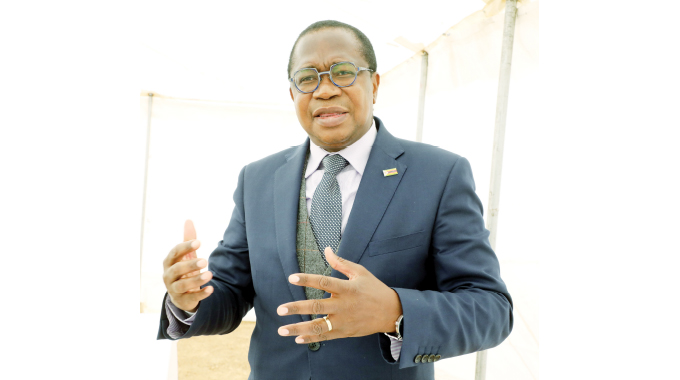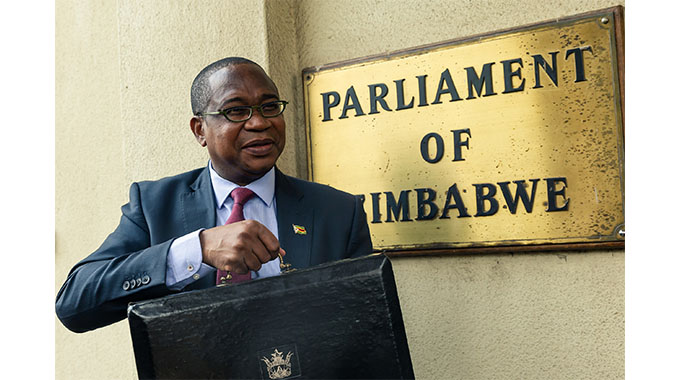Treasury presents $900 billion booster budget

Mashudu Netsianda / Nqobile Bhebhe, Senior Reporters
FINANCE and Economic Development Minister, Professor Mthuli Ncube, yesterday tabled a $929 billion supplementary budget citing the need to steer development progress amid increasing costs occasioned by unforeseen global shock-induced inflationary pressures, which have eroded the original 2022 budget framework.
In order to cushion workers and enhance disposable incomes, the minister also announced an increase in the tax-free threshold effective next month to $600 000 from $300 000 per year and adjusted the tax band ceiling to $12 million from the current $6 million per year, above which tax will be levied at a rate of 40 percent.
The local currency tax-free bonus threshold has also been reviewed upwards from $100 000 to $500 000 with effect from 1 November 2022.

Professor Mthuli Ncube
The tax-free threshold was at the beginning of the year increased to $300 000 or US$1 200 per annum for remuneration earned in local and foreign currency.
However, the resultant adjustments to wages and salaries in response to macro-economic developments have resulted in bracket creep on local currency denominated remuneration.
Presenting the 2022 Mid-term fiscal policy statement in Parliament, Finance and Economic Development Minister Professor Mthuli Ncube said Zimbabwe, like the rest of the world, has not been spared by the adverse global developments that include the on-going Russian-Ukraine war, which has disrupted key supply chains with detrimental effect on the productive sector.
While the country’s economy remains on steady growth, the Treasury has revised downwards projected Gross Domestic Product (GDP) estimates from the initial 5.5 percent to 4.6 percent, reflecting the impact of the external global environment.
To that end, Minister Ncube said the first half of the year has been characterised by increasing revenues and expenditure pressures, which have necessitated the revision of the approved 2022 National Budget.
“The revision is necessary to allow spending agencies to meet increasing costs of undertaking originally budgeted programmes and projects that will ensure the 2022 objectives are met,” he said.
“The (initial) national budget was premised on revenue collection of $850.8 billion, which is 16.8 percent of GDP, expenditures of $968.3 billion and a target budget deficit of $76.5 billion, which is 1.5 percent of GDP.
“Unaudited outturn during the first half indicates revenue collections of $506.6 billion against expenditures of $534,5 billion, resulting in budget deficit of $27,8 billion against a target deficit of $45 billion,” said Prof Ncube.
With a supplementary budget, he said revenue collections to year-end are now projected at $1,7 trillion while expenditures are now estimated at $1,9 trillion.
This is against the approved budget of $968,3 billion, entailing additional spending of $929 billion.
Prof Ncube said the bulk of the supplementary budget (53 percent) would be channelled towards employment costs to cushion public sector workers against increasing cost of living.
The balance of the additional resources are going towards meeting Government consumables, (18 percent), capital projects, (19 percent) and social benefits would be allocated seven percent.
“Government remains committed to addressing the welfare of civil servants in a fiscally sustainable manner. The challenges of yester-year where the wage bill crowded out other development expenditures should be avoided in order to create the right conditions for sustainable economic growth that will provide scope for payment of decent salaries to our hard-working workers,” said the minister.
As such, Prof Ncube said the tax-free threshold review was meant to cushion employees from inflationary pressures, which will increase disposable incomes, spur consumption spending and income for corporates.
He said the revised projected expenditure on the compensation of employees rose by 53 percent from the approved budget of $340 million to $832 million.
In terms of the budget for social benefits, there is an additional funding of $61 million from the $35 million in the 2022 approved budget.
Prof Ncube also introduced a rebate of duty on equipment used in scientific research imported by institutions approved by ministries responsible for health, mining, agriculture and higher and tertiary education.
He said this was in realisation of the importance of innovation and research as key pillars towards sustainable development and industrialisation.
“The education and training system in Zimbabwe is now geared towards this initiative. In that regard, it’s important that local research institutions be capacitated through infrastructure that promotes knowledge, which is adaptive and resilient to common and emerging threats such as climate change, infectious diseases and drug resistance, among others,” said Prof Ncube.
According to the supplementary budget, ministries of Lands, Agriculture, Water, Climate and Rural Resettlement and Primary and Secondary Education top the list of main beneficiaries with an additional $100,7 billion and $103,9 billion, respectively.
Industry and Commerce has been allocated an additional $166,2 billion, Mines and Mining Development ($158,2 billion), Transport and Infrastructure development ($465 billion) and the Environment, Tourism and Hospitality Industry ministry has a share of $362 billion.
“On agriculture, the resources are earmarked for grain procurement, preparations for the forthcoming season and dam construction. For the rest of the votes, the additional funding is meant to meet increased operational costs, the wage bill and identified projects and programmes,” said Prof Ncube.
Guided by the National Development Strategy (NDS1:2021-2025), the Government is undertaking several major capital-intensive infrastructural development projects in the country with the Matabeleland region being one of the recipients of the big projects being implemented.
The projects include roads, dams, schools, health facilities and irrigation schemes. The reconstruction of roads is an economic enabler and a driver towards the attainment of the Government’s vision of an upper-middle-income economy by 2030.











Comments